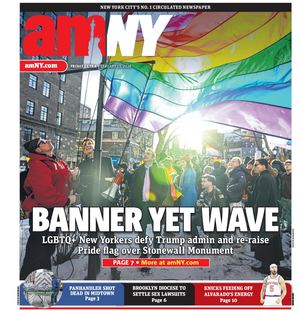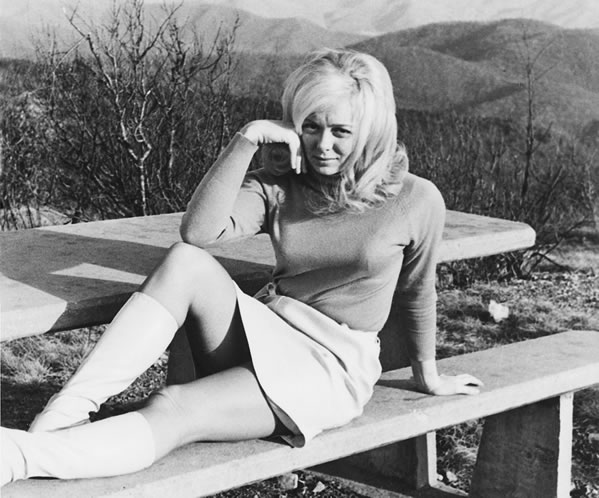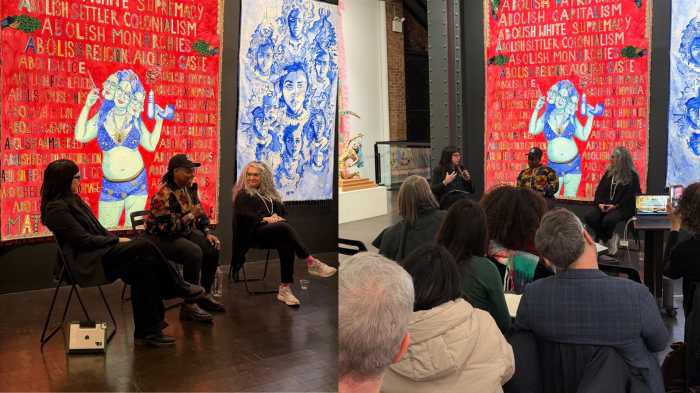BY STEVE ERICKSON
The odd riddle of Joyce McKinney’s life makes for no easy jokes
After his 1997 masterpiece “Fast, Cheap and Out of Control,” documentarian Errol Morris turned toward political subjects. Unfortunately, his work suffered for it.
Alec Baldwin’s fictional incarnation of Robert McNamara in the made-for-HBO movie “Path to War” was more nuanced and critical than Morris’ interviews with the real McNamara in “The Fog of War.” His documentary about Abu Ghraib, “Standard Operating Procedure,” aestheticized violence in a way that would be appropriate for a Dario Argento horror film, but seemed horribly out of place in a film about real-life torture.
Morris’ influence is everywhere –– practically every show on the Investigation Discovery channel owes something to his mixture of documentary and fictional reenactments in “The Thin Blue Line.” Despite the topicality of his recent work, however, his relevance seemed to be fading. Thankfully, “Tabloid” brings it back.
In 1977, Joyce McKinney, a former beauty queen, became obsessed with young Mormon missionary Kirk Anderson. Suddenly, he disappeared. Not understanding the traditions of Mormon religion, when Anderson was sent by his church to England, McKinney thought something sinister had happened. Along with a friend and two bodyguards, she traveled to England to find him.
Wielding a fake gun and real chloroform, McKinney kidnapped Anderson. What happened next is the subject of legal proceedings. Depending on whom one believes, it led to either three days of consensual sex in the British countryside or forced bondage and rape. Released on bail, McKinney avoided a trial by flying back to the US in disguise, but not before she had her moment of celebrity in the British tabloid press.
In many respects, “Tabloid” is a more successful return to the themes of “Mr. Death,” Morris’ film about Holocaust “revisionist” Fred Leuchter. Granted, the stakes are lower here, but they’re still real — McKinney scoffs at the notion that a woman could rape a man. Morris offers a charismatic subject room to lay out her case and then gives the audience reason to doubt her veracity. “Tabloid” reveals itself as a mirror image of the phenomenon the story created in the British media in the late ‘70s, when one paper depicted McKinney as a wronged innocent and another portrayed her as a scheming prostitute.
Filmed in Cinemascope against a dark background, “Tabloid” relies mostly on interviews with McKinney and a few others. Anderson refused to be interviewed. McKinney is a compelling enough presence that Morris could have filmed her talking for 90 minutes and come away with a fascinating film. However, he takes his film’s title as an aesthetic directive. Most onscreen text appears in a font that suggests newspaper headlines. Morris and his editor created a collage, including plentiful sound effects, to put the interviews in context. The effect is alternately playful and gimmicky.
Some have accused “Tabloid” of unfairly mocking McKinney. In fact, Morris has long been accused of making fun of his subjects. McKinney is unhappy with the film and has posted threats of lawsuits on the websites of critics whose take on her life she disagrees with. It’s true that the film suggests she may be “barking mad,” as one journalist puts it. It also finds an admirable strength in her obsessiveness, especially when it turns from men to dogs. The woman at the heart of “Tabloid” can stand up to any amount of audience laughter.
“Tabloid” offers several odd ellipses. It never explains how McKinney financed her trips around the world, especially the one to get her beloved dog Booger cloned in Korea. (Someone estimates the procedure’s cost at $150,000.) It mentions that the pressures of celebrity drove her to agoraphobia in the ‘80s, but says nothing about whether the condition was overcome. Still, the fact that this information is missing works given the overall unknowability of McKinney’s story. There’s plenty of reason not to believe her, but in the end, only she and Anderson know what went on in the cottage in the English countryside.
Morris has dabbled in TV with the show “First Person,” which ran for two seasons, but it didn’t exactly look like conventional Reality TV. One wonders if “Tabloid” is his answer to the format, especially female-centered shows like “Mob Wives” and “The Real Housewives” franchise. McKinney is nobody’s idea of a heroine or role model, but she has a dignity that Snooki will never achieve, no matter how long she spends on a tanning bed.






































